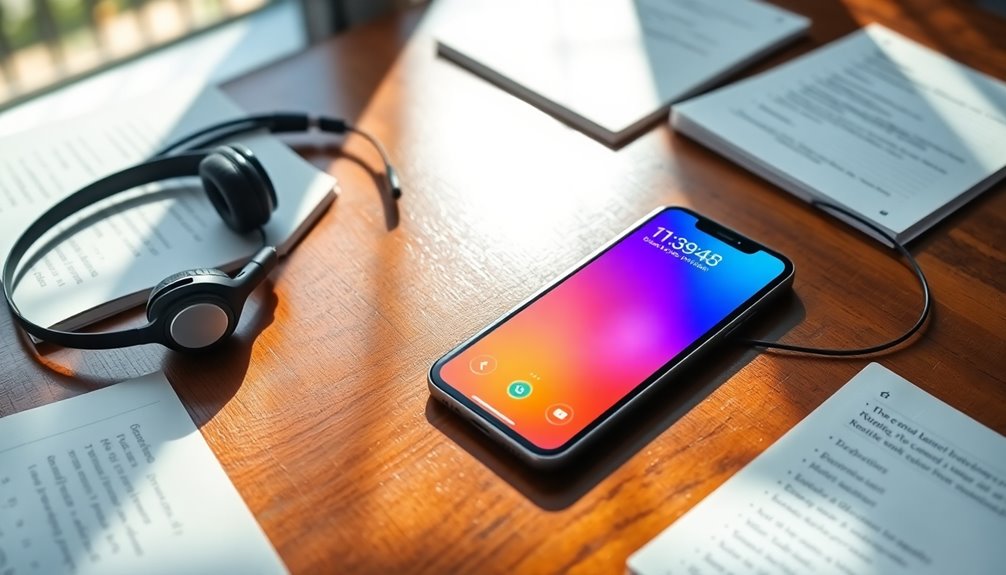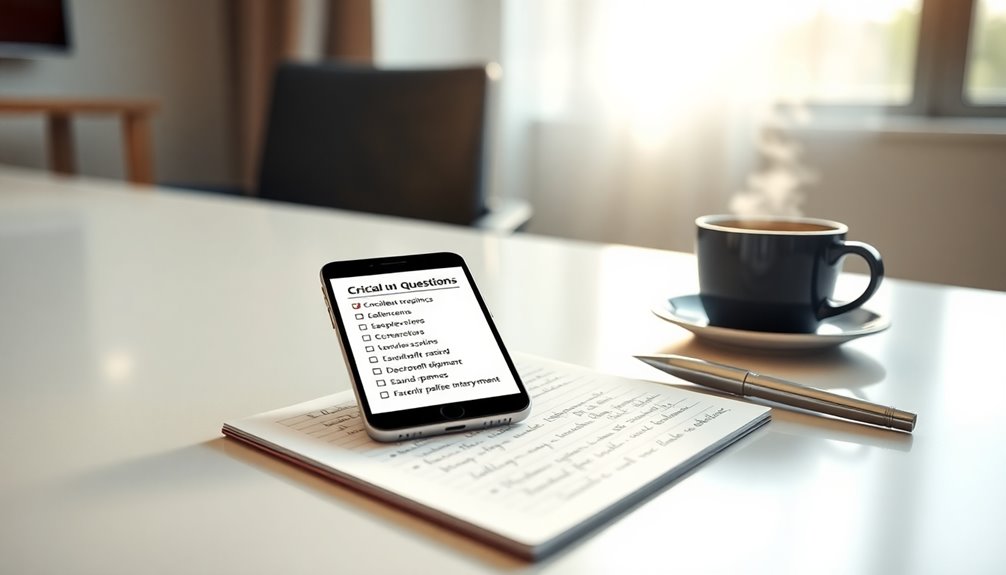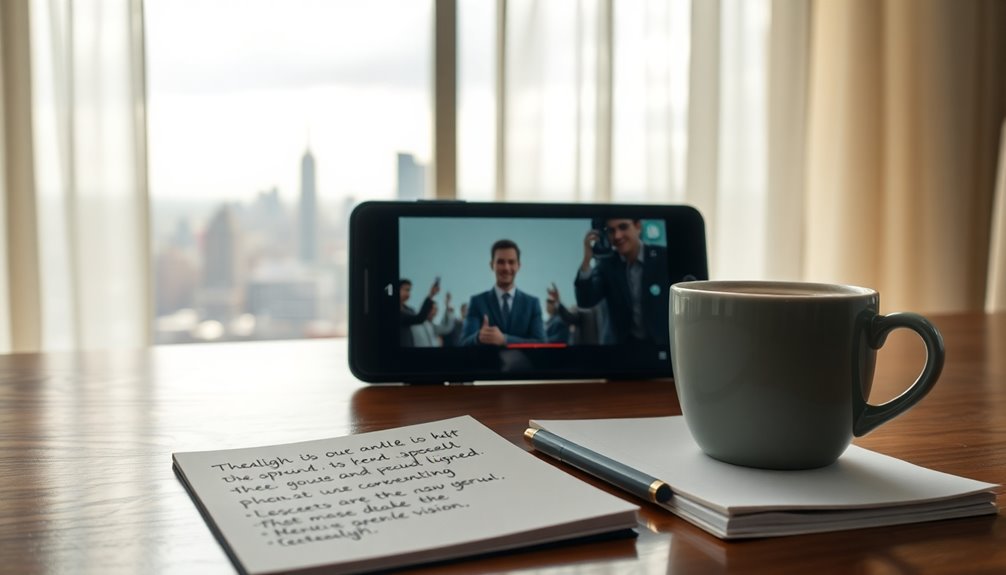Job Interview
Crucial Questions for Phone Interview Success
Inquiring about key questions can elevate your phone interview success; discover which queries can leave a lasting impression on potential employers.

To ace your phone interview, preparation is key. Start by researching the company's background and values to show genuine interest. Prepare answers for common questions and a few thoughtful inquiries about the role's day-to-day tasks, the company culture, and career growth opportunities. Asking about challenges current employees face can provide essential insights into the work environment. Always articulate your excitement about the position; this can set you apart. Remember, the right questions can demonstrate your alignment with the company's goals and culture. There's much more to discover about enhancing your interview approach.
Key Takeaways
- Prepare 2-3 open-ended questions about day-to-day tasks and role expectations to demonstrate interest and understanding of the position.
- Inquire about company culture to assess alignment with personal values and work style.
- Ask about career growth opportunities, including training and promotion paths, to evaluate long-term potential within the organization.
- Seek insights on challenges current employees face to gain a realistic perspective on the work environment.
- Clarify performance metrics and evaluation processes to ensure alignment with personal goals and expectations for success.
Importance of Preparation

When it comes to phone interviews, preparation is key to making a strong impression. You should approach the interview as a conversation, not an interrogation.
Research the company's background and values to show your genuine interest. Prepare answers to common interview questions and think of insightful questions to ask the interviewer. This illustrates your seriousness about the position and prevents any impression of disinterest.
Practicing your responses can boost your confidence and clarity, helping you communicate effectively. Even though it's a phone interview, dressing appropriately can mentally prepare you for the conversation.
Key Questions to Ask

Asking the right questions during a phone interview can greatly enhance your understanding of the role and the company. Focus on two to three open-ended questions that relate specifically to the position. This shows your genuine interest and helps you gauge if the role aligns with your career goals.
You might ask about the typical day-to-day tasks or clarify any ambiguities in the job posting. Prepare backup questions in case your primary ones are answered during the conversation.
Questions about company culture and opportunities for growth can also be insightful. Remember, your inquiries reflect your preparation and enthusiasm, so make them count!
Understanding the Role

Understanding the role you're applying for is crucial to ensuring it aligns with your skills and career aspirations. Before the interview, take the time to carefully review the job description. Identify key responsibilities and required skills to see how your experience fits.
Consider what excites you about the position and be ready to articulate that during the call. It's also essential to clarify any ambiguities in the job posting, especially regarding duties.
Prepare specific questions about day-to-day tasks and expectations to demonstrate your interest. This preparation not only boosts your confidence but also helps you decide if the role is the right fit for your career path.
Work Environment Insights

Gaining insights into the work environment is key to ensuring a good fit between you and the company. During your phone interview, ask questions that help you understand the company culture. Is it collaborative or more independent? You might inquire about how team members interact or share responsibilities.
Also, consider asking about the challenges current employees face in the role; this can reveal much about the work atmosphere. Don't forget to ask the interviewer about their personal experiences at the company. This can offer valuable perspectives on day-to-day life there.
Finally, seek clarification on performance metrics and evaluation processes; knowing how success is measured can help you gauge the environment's alignment with your own work style.
Career Growth Opportunities

While getting a clear picture of the work environment is essential, it's equally important to explore the potential for career growth within the organization.
Ask about the typical career path for someone in your role. You want to know how promotions work and what skills are valued for advancement.
Inquire about training opportunities or mentorship programs that support professional development. Understanding how the company fosters growth will help you assess if it aligns with your long-term goals.
Additionally, ask about the experiences of employees who've progressed within the organization. This insight can provide you with a clearer picture of what your future could look like, making it easier to decide if this is the right place for your career aspirations.
Company Vision and Stability

When you ask about a company's vision for the future, you're not just uncovering its goals; you're also evaluating its stability. Understanding where the company sees itself in five years can reveal its commitment to growth and adaptability.
Look for insights into how the business plans to navigate challenges and seize opportunities. You might ask about recent changes in strategy or how the company responded to industry shifts. This information helps you gauge if the organization is poised for long-term success.
Additionally, consider how the company's values align with your own. A strong vision rooted in stability often leads to a positive work environment and career growth, ensuring you're making a wise decision for your future. Furthermore, understanding the importance of advance directives can be crucial in evaluating how the company supports its employees during personal crises.
Follow-Up Strategies

Successful follow-up strategies can greatly enhance your chances of making a lasting impression after a phone interview.
Start by sending a thank-you email within 24 hours, expressing gratitude for the opportunity and reiterating your interest in the position. Be sure to mention specific points discussed during the interview to remind them of your conversation. This shows you're engaged and attentive.
In your email, you can also inquire about the next steps in the hiring process. Keep your communication professional and concise, avoiding overly casual language.
Finally, if you haven't heard back within the timeframe they provided, don't hesitate to follow up again politely. This indicates your enthusiasm and commitment to the role.
Frequently Asked Questions
What Should I Include in My Resume for This Role?
When you're crafting your resume for this role, focus on highlighting relevant skills and experiences that align with the job description.
Include quantifiable achievements to demonstrate your impact in previous positions. Tailor your summary to reflect your career goals and the company's values.
Don't forget to mention any certifications or training that apply.
Finally, make sure your resume is clear, concise, and free of errors to make a strong impression.
How Long Does the Interview Process Typically Take?
The interview process can feel like an eternity, but it usually takes anywhere from a couple of weeks to a month.
You'll likely have multiple stages, including phone screens and in-person interviews.
It's crucial to stay patient and proactive during this time. Don't hesitate to follow up; it shows your enthusiasm.
Each company's timeline can vary, so keep in mind that thorough evaluations can lead to better job fit for everyone involved.
What Are the Company's Core Values?
When you ask about the company's core values, it shows your interest in its culture and mission.
You're looking for insights into what drives the organization and how they align with your own values.
Understanding these values helps you gauge if the company is a good fit for you.
Listen carefully to the interviewer's response, as it reveals not just priorities, but also the environment you might be joining.
Who Will I Be Working With Directly?
Think of your future workplace like a team of musicians in an orchestra, each playing an essential role.
When you ask, "Who will I be working with directly?" you're tuning into the harmony of collaboration. This question lets you understand the dynamics of your potential team, revealing who you'll collaborate with and their roles.
It also shows your interest in teamwork, setting the stage for a successful relationship from the get-go.
Is Remote Work an Option for This Position?
You should definitely ask if remote work is an option for this position.
It's important to understand the company's stance on flexibility, especially in today's work environment. Knowing whether you can work remotely helps you gauge how it fits into your lifestyle.
If they offer remote work, you might want to ask about their policies on communication and team collaboration while working from home. This shows your interest in aligning with their work culture.
Conclusion
As you prepare for your phone interview, think of it as a dance—each question you ask is a step that leads to a deeper connection. By engaging thoughtfully, you not only showcase your interest but also illuminate the path toward a role that aligns with your career aspirations. Remember, this conversation is a two-way street, where both you and the interviewer explore the rhythm of potential collaboration. Step confidently, and let your curiosity guide you to success.
Eugene brings a fresh, dynamic voice to our platform as one of our talented Writers. Specializing in research-driven content, he explores the latest findings in psychology and personal growth, translating them into actionable insights for our readers. Eugene’s work is fueled by a curiosity about what makes us tick and a desire to help others unlock their potential.
Job Interview
Politely Decline & Still Keep Their Future Interest—Here’s How!
Gain insights on how to gracefully decline requests while preserving future opportunities—discover the art of maintaining strong connections.

When you need to politely decline a request, it's crucial to set clear boundaries while keeping the door open for future opportunities. Start by understanding the request and express genuine appreciation for it. Use direct but respectful language to communicate your decision, and offer alternatives if possible, like suggesting someone else who might help. Maintaining a positive tone will reinforce goodwill, showing that you value the relationship. Follow up with a thank-you note to highlight your interest in future collaboration. There's plenty more you can explore to master this skill and keep those connections strong.
Key Takeaways
- Clearly articulate your reasons for declining while expressing appreciation for the opportunity to maintain respect and professionalism.
- Suggest alternative resources or colleagues who may assist, demonstrating your willingness to help despite your refusal.
- Follow up with a thank-you note to reinforce goodwill and leave a positive impression after declining the request.
- Keep communication lines open by expressing interest in potential future collaborations to foster ongoing relationships.
- Use a positive tone and supportive language to encourage future interactions and show value in the requester's initiatives.
Importance of Polite Declines

When it comes to managing your time and energy, politely declining requests is essential. By declining the offer, you prioritize your core responsibilities and prevent burnout. It's vital to communicate your decision with clear and respectful communication, which helps set realistic expectations and reinforces your boundaries.
Maintaining professionalism while saying no fosters respect and preserves workplace relationships. This approach makes it easier for you to collaborate in the future. A polite decline, accompanied by a brief explanation, reflects your competence and shows that you value both your time and the requestor's expectations.
Additionally, offering alternative solutions or referrals when you decline a business request demonstrates your willingness to assist, keeping the lines of communication open for potential future collaboration. Ending your response on a positive note can leave a lasting impression, ensuring that the individual understands your decision while still feeling respected. This way, you maintain a professional rapport and open doors for future opportunities. Remember, it's not about saying no; it's about how you say it that counts. By practicing healthy boundaries, you can ensure your decisions align with your personal and professional values.
Understanding Different Requests

Understanding the various types of requests you encounter is essential for effective prioritization and decision-making. By grasping the nature of these requests, you can assess their urgency and relevance to your current responsibilities. This understanding helps you prioritize effectively while maintaining professionalism in your responses.
Consider these common types of requests:
- Coworker Assistance: Requests for help from colleagues often indicate a collaborative environment but can impact your workload.
- Customer Inquiries: These requests are vital for maintaining customer satisfaction and should be addressed promptly.
- Vendor Proposals: When vendors approach you with offers, understanding their implications helps you decide the best course of action.
- Meeting Invitations: Recognizing the purpose and potential benefits of a meeting can guide your decision to accept or decline.
Additionally, acknowledging the emotional connection between humans and dogs can enhance your response to dog quotes.
Steps to Politely Decline

To politely decline a request, start by understanding what the requester truly needs. Communicate your response with respect and clarity, ensuring your message is straightforward yet kind. Finally, consider offering alternative solutions to show your willingness to help while maintaining your boundaries.
Understand the Request Clearly
Steering requests can be tricky, especially when you need to decline. To do this effectively, you must first understand the request clearly. Here are four steps to guide you:
- Ask Clarifying Questions: Start by inquiring about the urgency and necessity of the request. This helps you gauge its importance and your capacity to respond.
- Restate Concerns: Show empathy by restating the requester's concerns. This guarantees you accurately grasp their needs before making a decision.
- Assess Your Workload: Consider how the request impacts your current commitments. This evaluation allows you to determine whether you can realistically accommodate it without compromising quality.
- Explore Alternatives: Think about potential solutions that might satisfy the requester's needs while allowing you to maintain your commitments.
Once you've gathered this information, you can decline an offer with a brief explanation. Clearly communicate your understanding of the request and your reason for declining. This approach is respectful and professional, fostering goodwill for future interactions.
Communicate With Respect
While it's essential to maintain professionalism, declining a request doesn't have to feel uncomfortable. When you need to decline the offer, communicate with respect. Start by acknowledging the requester's efforts with a simple thank you or an apology for not being able to accommodate them. This shows you value their intentions.
Next, clearly articulate your reason for politely declining. You might say, "I have much on my plate right now," which conveys your current commitments without excessive detail. Using direct language reduces ambiguity and helps them understand your boundaries.
After explaining your situation, wish them the best in their endeavors. This not only softens the blow but also leaves a positive impression. If appropriate, suggest that you'd be willing to assist in a different capacity in the future, helping to maintain the relationship.
Lastly, consider following up with a brief note later on. Checking in or expressing openness to future opportunities reinforces your interest in keeping the connection alive. By communicating with respect throughout the process, you guarantee that even in declining, you preserve the possibility of collaboration down the road. Remember, just as in effective co-parenting plans, maintaining respect and communication is key to fostering future connections.
Offer Alternative Solutions
Offering alternative solutions can transform a decline into an opportunity for collaboration. When you find yourself needing to decline a request, consider suggesting two or three feasible alternatives that align with the requester's needs. This not only demonstrates your willingness to help but also reinforces your professional boundaries. Here are some steps to effectively offer alternatives:
- Identify Needs: Understand the requester's main goals and objectives to tailor your alternatives effectively.
- Propose Alternatives: Offer two or three options that can fulfill similar needs, showcasing your commitment to collaboration.
- Encourage Feedback: Invite the requester to share their thoughts on your alternatives. This involvement fosters a sense of partnership.
- Maintain Communication: Keep the conversation going about future opportunities, emphasizing your interest in potential collaboration. Additionally, recognizing the impact of extended separations can guide you in maintaining a positive relationship with the requester.
Techniques for Effective Refusals

When you need to refuse a request, clear communication is key to avoiding misunderstandings. Offering constructive alternatives not only softens the blow but also shows your willingness to help, keeping the door open for future opportunities. By mastering these techniques, you can maintain professionalism while preserving valuable relationships.
Direct Communication Methods
Effective communication is key to maintaining healthy boundaries, especially when you need to decline a request. When you choose direct communication methods, you can convey your message clearly while still being polite. Here are some techniques to help you decline a business offer effectively:
- Be Direct: Use concise language, such as "I'm unable to assist at this time due to current commitments." This leaves no room for misinterpretation.
- Empathize: Start with an apology for any inconvenience your refusal may cause. This sets a respectful tone and shows you value their request.
- Reinforce Future Interest: Let them know you'd love to revisit this opportunity down the line. This keeps the door open for future collaboration.
- Offer Alternatives: While you're declining, suggest another professional or resource who might help. This illustrates your willingness to assist even when you can't take on the request.
Offering Constructive Alternatives
Steering through refusals doesn't have to be uncomfortable, especially when you can suggest constructive alternatives. When you need to decline a request, consider offering alternative solutions that keep the conversation positive. For instance, if you can't take on a project, you might suggest another person in your team who has the capacity or propose a different timeline that aligns better with your current commitments.
By presenting two or three realistic options related to the original request, you help mitigate disappointment while reinforcing your intention to collaborate. This approach not only shows that you value the other person's needs but also aligns with your business goals and responsibilities.
Encouraging feedback on your proposed alternatives allows the requester to feel heard and appreciated, enhancing your relationship despite the refusal. Use clear and concise language when presenting these options to avoid any ambiguity. Highlighting your commitment to quality work and your current responsibilities helps maintain your credibility. Additionally, just like how pet therapy can enhance emotional well-being for those in dementia care, your willingness to suggest alternatives can uplift the spirits of those involved in the conversation.
In this way, you can decline a request while still fostering a collaborative environment and leaving the door open for future opportunities. Always aim to look forward, as this sets a positive tone for ongoing interactions.
Examples of Declining Requests

Often, you'll find yourself in situations where you need to decline a request. It is crucial to handle these moments with care, especially when aiming to maintain goodwill for future collaboration. Here are some examples of how to politely decline:
- Expressing Gratitude: Start by thanking the person for the opportunity. For example, "I really appreciate you thinking of me for this project."
- Clear Explanation: Follow up with a brief reason for declining. You might say, "Unfortunately, I'm currently tied up with other commitments."
- Alternative Solutions: Offer alternatives to soften the refusal. For instance, "Though I can't assist directly, I can recommend someone who could help."
- Follow-Up Thank You: After declining, consider sending a thank-you note to reinforce goodwill. A simple message like, "Thanks again for considering me; I hope we can collaborate in the future!" can keep the door open.
Additionally, maintaining a positive mindset during these interactions can help foster a supportive environment for future opportunities.
Maintaining Future Relationships

Maintaining future relationships after declining requests is essential for fostering goodwill and potential collaboration. You can express genuine appreciation for the opportunity presented, signaling that their offer was valued, even though you had to refuse. This acknowledgment sets a positive tone and shows respect for their efforts.
Clear communication about your reasons for declining helps maintain understanding and respect. Keep your explanation concise to avoid unnecessary detail, which could lead to misunderstandings. It's crucial to convey your decision without diminishing the importance of their proposal.
Following up with a thank-you note is another effective way to strengthen your relationship. This small gesture demonstrates gratitude and reinforces your interest in keeping the lines of communication open. Make sure your note carries a respectful tone, as this will foster goodwill and leave a positive impression.
Lastly, consider suggesting the possibility of future collaboration. By expressing your willingness to connect again down the line, you reaffirm your commitment to maintaining a professional relationship. With these strategies, you can politely decline requests while ensuring future opportunities remain available. Additionally, cultivating a strong network can lead to new avenues for collaboration in the future.
Frequently Asked Questions
How Do You Politely Decline Someone's Advances?
When you want to politely decline someone's advances, start by appreciating their interest. Be clear and respectful in your response, stating that you're unavailable. You don't need to go into too much detail; a simple explanation of your personal circumstances will suffice. If it feels right, suggest maintaining a friendly relationship. Keeping a calm and polite tone throughout can help guarantee that both of you leave the conversation with mutual respect.
How Do You Politely Decline Interest?
You find yourself in a delicate situation, the tension hanging in the air. You appreciate their interest, but you've got to be clear. Say something like, "I'm truly grateful for your offer, but I can't accept it right now." By sharing your reasons briefly, you clarify your stance. Then, suggest reconnecting later to keep the door open. A simple thank-you note afterward can reinforce goodwill, ensuring a positive relationship for the future.
How Do You Respectfully Decline Professionally?
When you need to respectfully decline a professional opportunity, start by clearly stating your decision. Express gratitude for the opportunity and provide a brief reason for your refusal, keeping it professional. You could suggest alternative solutions or referrals to show your willingness to help. Maintain a positive tone to reinforce goodwill and follow up with a thank-you note, ensuring you keep the door open for future interactions and collaborations.
How Do You Politely Decline Someone Coming Over?
When someone invites you over, start by thanking them for the kind gesture. Let them know you can't make it, perhaps due to prior commitments or needing some personal time. Keep your tone friendly and respectful. You might say, "I really appreciate the invite, but I can't come over this time." Suggest meeting up another day or a virtual hangout soon. Reinforce how much you enjoy their company to keep the connection strong.
Conclusion
To sum up, politely declining requests while preserving future interest is an art worth mastering. Remember, "You catch more flies with honey than vinegar." By approaching refusals with kindness and clarity, you can maintain strong relationships and leave the door open for future opportunities. So, don't hesitate to say no when needed, but do it with grace. This way, you foster respect and understanding, ensuring that your connections remain positive and fruitful down the line.
Felicity, our Author, pens in-depth articles and guides that delve into the heart of personal discovery. Her narrative-driven approach weaves together theory, practice, and personal anecdotes, making the journey of self-exploration both relatable and inspiring. Felicity’s contributions help illuminate the path for those seeking a deeper understanding of themselves and their relationships.
Job Interview
Future Aspirations: Your Career Path Ahead
Transform your career path by defining your future aspirations and uncovering strategies that can lead you to success. What will you discover next?

Your career path ahead depends on defining your future aspirations. Start by reflecting on your passions and strengths. Visualize the roles you'd thrive in. This clarity helps you align your ambitions with industry trends and opportunities. Seek mentorship to enhance your leadership skills and expand your professional network. As you set your goals, balance ambition with realism to guarantee they're achievable. Remember to regularly articulate your vision and connect it to the mission of potential employers. These steps will guide you toward a rewarding career. Browse on to uncover strategies that can further shape your journey.
Key Takeaways
- Reflect on your passions and strengths to define a clear career direction aligned with your future aspirations.
- Research industry trends to identify growth opportunities that match your career goals and skills.
- Set realistic milestones while remaining ambitious to achieve your long-term career vision.
- Seek mentorship and networking opportunities to gain insights and guidance for your career path.
- Continuously invest in skill development through courses and certifications to enhance employability and career advancement.
Preparing for Your Career Journey

Preparing for your career journey involves a proactive approach that can considerably enhance your chances of success. Start by anticipating common interview questions and researching the company you're applying to.
Familiarize yourself with the job description, ensuring you understand the responsibilities and expectations. Explore the company's client base to grasp their market position and values.
Reviewing the job description right before your interview helps reinforce your knowledge and confidence. This preparation not only showcases your interest but also allows you to tailor your answers effectively. Additionally, obtaining relevant certifications like ISTQB can significantly boost your employability in the competitive QA field.
Defining Your Aspirations

Defining your career aspirations is essential for shaping a successful professional journey. Start by reflecting on what you truly want in your career. Consider your passions, strengths, and the impact you wish to make.
Visualizing where you see yourself in the next 1, 5, or even 10 years can help you pinpoint specific roles and industries that excite you. Identify the skills and experiences you need to reach these goals, and think about how you can develop them over time.
Being clear about your aspirations not only guides your decisions but also helps you stay motivated. Remember, it's about finding a balance between ambition and realism, ensuring your aspirations align with achievable milestones in your career path. Engaging in self-reflection techniques can significantly enhance your clarity and focus on your aspirations.
Aligning Goals With Opportunities

Successful career progression hinges on the alignment between your goals and the opportunities available in your chosen field. To effectively navigate this path, assess your aspirations against industry trends and position yourself strategically. Additionally, understanding startup stories can provide valuable insights into how others have successfully aligned their career goals with emerging opportunities.
| Goal | Opportunity | Action to Take |
|---|---|---|
| Gain leadership skills | Mentorship programs | Seek a mentor |
| Expand network | Industry events | Attend networking events |
| Enhance technical skills | Online courses | Enroll in relevant courses |
| Contribute to projects | Team collaborations | Volunteer for projects |
Balancing Ambition and Realism

Achieving your career goals requires a careful balance between ambition and realism. You want to aim high, but it's imperative to set achievable expectations.
Aspiring for leadership roles is admirable, yet it's important to recognize the time and effort required to get there. Avoid making unrealistic claims about rapid advancement; instead, demonstrate a clear understanding of your industry and the role's responsibilities.
Assess your skills and experiences, aligning them with your aspirations while remaining grounded in reality. This approach not only enhances your credibility but also prepares you for the challenges ahead.
Communicating Your Career Vision

When you articulate your career vision, it's essential to convey not just your aspirations but also how they align with the company's goals.
Start by clearly stating what you aim to achieve in your career, whether it's a leadership role or mastering specific skills. Connect your aspirations to the company's mission, demonstrating that you understand their objectives.
Discuss your commitment to personal growth and how it can contribute to the organization's success. Be realistic about your ambitions, focusing on achievable milestones.
Emphasize your willingness to take on new challenges and responsibilities. This approach shows potential employers that you're not only forward-thinking but also a valuable asset who's invested in their future as well. Additionally, consider how your vision aligns with emerging fields like AI Cybersecurity Jobs, which are critical for safeguarding digital assets in today's tech landscape.
Engaging in Meaningful Conversations

While engaging in meaningful conversations during an interview, it's crucial to foster a genuine dialogue that goes beyond standard question-and-answer exchanges. You should actively listen and respond thoughtfully to the interviewer's insights. This approach not only shows your interest but also builds rapport. Asking open-ended questions can further the discussion, allowing you to explore the company's culture and values. Additionally, demonstrating knowledge about software quality assurance can impress interviewers and show your commitment to the field.
| Key Strategies | Example Questions |
|---|---|
| Active Listening | "Can you share more about the team culture?" |
| Open-Ended Inquiries | "What are the biggest challenges the team faces?" |
| Reflective Responses | "That's interesting; how does that impact daily operations?" |
| Personal Connection | "I noticed your recent project in XYZ; could you elaborate on that?" |
| Future Aspirations | "Where do you see this role evolving in the next few years?" |
Engaging this way can lead to deeper insights and a more meaningful connection.
Leveraging Resources for Growth

Resources are essential for your career growth, acting as the building blocks for skill enhancement and professional development. You can leverage various resources to propel yourself forward, including online courses, mentorship programs, and professional networks.
Identify the tools that align with your career goals and actively seek them out. For instance, join industry associations or participate in workshops to expand your knowledge and connections.
Don't underestimate the power of social media; platforms like LinkedIn can help you connect with industry leaders and discover job opportunities.
Additionally, consider utilizing your current workplace resources, such as training sessions or cross-departmental projects, to gain new skills. Moreover, engaging in personalized learning can significantly enhance your ability to adapt to evolving industry demands and improve your overall effectiveness in your chosen field.
Frequently Asked Questions
How Can I Identify My True Career Passions?
To identify your true career passions, start by reflecting on what excites you.
Think about activities that make you lose track of time or subjects you love learning about.
Experiment with different roles or volunteer opportunities to gain insight into what resonates with you.
Talk to professionals in fields of interest to gather perspectives.
Keep a journal to note your feelings and thoughts, helping you clarify what truly drives you.
What Skills Are Most Valuable in My Chosen Industry?
You might think technical skills are all that matters, but soft skills are just as essential in your industry.
Strong communication, adaptability, and teamwork can set you apart. Problem-solving abilities and emotional intelligence help in maneuvering challenges effectively.
Stay updated with industry trends and continuously develop your skills. Embrace learning opportunities, as they'll enhance your value and contribute to your growth.
Balancing both hard and soft skills is key to success.
How Do I Network Effectively for Career Growth?
To network effectively for career growth, start by attending industry events and engaging with professionals in your field.
Utilize social media platforms like LinkedIn to connect and share insights.
Don't hesitate to reach out for informational interviews, as these can open doors to new opportunities.
Remember to follow up with those you meet, expressing gratitude and interest in their work.
Building genuine relationships will help you grow and advance in your career.
What Common Mistakes Should I Avoid in My Career Journey?
When it comes to your career journey, don't put all your eggs in one basket. Avoid common mistakes like neglecting networking, failing to seek feedback, or resisting change.
Stay proactive by continuously updating your skills and remaining adaptable to new opportunities. Don't underestimate the power of a strong work ethic and effective communication.
Finally, remember to set realistic goals and be open to learning from both successes and setbacks along the way.
How Can I Measure My Career Progress Over Time?
To measure your career progress over time, start by setting clear, achievable goals.
Regularly assess your skills and accomplishments against these goals. Keep a record of projects and feedback you receive.
Seek out mentorship and networking opportunities to gain perspective on your growth.
Additionally, reflect on your experiences, noting how they've shaped your abilities.
Conclusion
As you forge your career path, remember that your aspirations shape your journey. Picture yourself five years from now—what does success look like for you? By defining your goals and aligning them with opportunities, you can navigate challenges with clarity and confidence. Communicate your vision effectively, and engage in conversations that inspire growth. Embrace the resources available to you, and watch as your career transforms into a fulfilling adventure that resonates with your true self.
Eugene brings a fresh, dynamic voice to our platform as one of our talented Writers. Specializing in research-driven content, he explores the latest findings in psychology and personal growth, translating them into actionable insights for our readers. Eugene’s work is fueled by a curiosity about what makes us tick and a desire to help others unlock their potential.
Job Interview
11 Essential Strategies to Master Your Director of Marketing Program Management Interview – #7 Is Key
Crack the code to acing your director of marketing interview with these 11 essential strategies—discover why strategy #7 could change everything.

To master your director of marketing program management interview, focus on preparation and presentation. Research the company thoroughly and tailor your answers accordingly. Practicing mock interviews helps refine your responses. Use the STAR method to clearly convey your achievements. During the interview, maintain confident body language and make direct eye contact. Ask insightful questions that show you understand the company's challenges and goals. Remember, sending a personalized thank-you note reinforces your interest and leaves a lasting impression. Each strategy plays a crucial role, especially #7. Stick with it to discover more valuable insights that can elevate your interview game.
Key Takeaways
- Research the company's marketing strategies and recent campaigns to tailor your responses and demonstrate industry knowledge during the interview.
- Utilize the STAR method to effectively showcase your achievements, focusing on quantifiable results and relevant experiences in program management.
- Prepare for behavioral questions by anticipating scenarios that highlight your adaptability, crisis management, and innovative problem-solving skills in marketing contexts.
- Emphasize your experience in budget management and collaboration with cross-functional teams to illustrate your leadership and communication capabilities.
- Follow up with a personalized thank-you email that references specific discussion points, reinforcing your interest and qualifications for the role.
Introduction to Job Interviews

Job interviews are your chance to shine and showcase what you bring to the table. This critical evaluation process allows you to demonstrate your management skills, experiences, and cultural fit within the organization. Employers want to see how well you align with their mission and goals, so it's essential to present your background effectively.
Preparing for the interview is key. Research the company thoroughly, and understand its values and objectives. You should be ready to articulate how your skills support their mission. Utilizing the STAR method (Situation, Task, Action, Result) can help structure your responses, allowing you to highlight your problem-solving abilities and quantify your contributions. Additionally, having a solid understanding of Software Development Life Cycle (SDLC) can enhance your discussions about project management and quality assurance.
Effective communication skills play a vital role in the interview process. Practice concise storytelling and active listening to engage with interviewers. This not only makes your responses clearer but also shows your ability to connect with others. Finally, don't forget to follow up with a thank-you email after the interview. This simple gesture reinforces your interest in the position and leaves a lasting positive impression on potential employers.
Preparing for the Interview

Preparing for your marketing interview means doing your homework and reflecting on your experiences. You'll want to research the company thoroughly, review your resume, and think about how your skills align with their needs. By honing your interview techniques, you'll boost your confidence and set yourself up for success. Additionally, incorporating self-care practices into your preparation can help reduce anxiety and enhance your overall performance.
Research and Self-Assessment
Before stepping into the interview room, diving deep into research and self-assessment is crucial. Start by thoroughly researching the company's recent marketing campaigns, products, and industry positioning. This allows you to tailor your responses and demonstrate a solid understanding of their business objectives.
Next, assess your own experiences and skills in alignment with the role's requirements. Focus on key achievements—like increased website traffic or improved customer engagement metrics—that highlight your management capabilities. Identify specific examples from your past work that showcase your ability to set KPIs, manage budgets, and achieve measurable results. Use the STAR method for structured storytelling to make these examples impactful.
Familiarize yourself with the company's culture and values, particularly how they integrate marketing strategies with broader business goals. This understanding helps you effectively convey your fit during the interview. Finally, prepare to discuss recent marketing trends and tools relevant to the industry. Showcasing your commitment to continuous learning and adaptability will underline your readiness to thrive in a fast-evolving marketing landscape. Additionally, understanding how AI systems can enhance marketing strategies will provide insights into innovative approaches.
Resume and Application Preparation
Having done your homework on the company and reflected on your qualifications, it's time to focus on your resume and application preparation. Begin by tailoring your resume to highlight your successes in marketing campaigns. For instance, showcasing achievements like a 25% increase in website traffic and a 15% boost in social media engagement within the first week can demonstrate your impact.
Don't forget to include quantifiable results from past roles, such as exceeding sales goals by 20% and maintaining brand buzz post-campaign. This will showcase your ability to drive business growth effectively.
Emphasize your experience in budget management, detailing oversight of a $5 million annual marketing budget and a 10% year-over-year decrease in marketing expenses while still achieving project goals.
Additionally, highlight your skills in data-driven decision-making, illustrating how you used analytics to inform campaign adjustments and optimize performance metrics to meet key performance indicators (KPIs).
Lastly, mention your collaborative approach in stakeholder communication and teamwork. This illustrates how you engaged cross-functional teams to ensure alignment on project goals and improved project outcomes, making your application stand out. Moreover, consider how your experience in budget management can create a compelling narrative that aligns with the current market trends in marketing effectiveness.
Interview Preparation Techniques
Interview preparation is key to showcasing your skills and experiences effectively. Start by using the STAR method for common interview questions. This technique helps you structure your answers, ensuring you highlight relevant experiences and skills. Practice your responses through mock interviews, aiming to communicate effectively while eliminating filler words. This will improve your storytelling abilities, making your answers more engaging.
Next, research the company thoroughly. Understand its mission, values, and recent marketing campaigns so you can tailor your responses and show genuine interest in the organization. Write down key points and metrics from your past marketing campaigns, emphasizing your data analysis skills. This demonstrates your data-driven decision-making and results-oriented mindset.
Don't forget to seek feedback from mentors or colleagues. They can provide valuable insights on your responses and presentation style, helping you identify areas for improvement before the actual interview. Additionally, consider how your experiences align with creating a retirement savings plan, as this showcases your strategic thinking and financial acumen. By employing these interview preparation techniques, you'll not only boost your confidence but also increase your chances of making a strong and lasting impression on your interviewers.
Dressing for Success

When it comes to dressing for a director of marketing interview, your attire plays a crucial role in making a strong first impression. You'll want to choose outfits that align with general guidelines while also considering gender-specific tips and the season. Let's explore how to present yourself in a way that reflects professionalism and confidence.
General Attire Guidelines
Dressing for success is crucial in making a positive first impression during your marketing interview. Your appearance plays a significant role in conveying professionalism, so it's essential to choose attire that aligns with the company's culture. Opt for dark suits or tailored dresses in neutral colors like navy, black, or grey. These choices project authority and professionalism, steering clear of overly casual clothing like jeans or sneakers.
Grooming is equally important. Make sure your hair is neat and your nails are tidy, as attention to detail reflects your commitment. Keep jewelry minimal and opt for clean, polished shoes appropriate for a formal setting. While you want to maintain a professional look, don't hesitate to incorporate a pop of color with a tie, blouse, or scarf to add a touch of personality.
Gender-Specific Attire Tips
Understanding the nuances of gender-specific attire can further enhance your professional image in a marketing interview. For women, tailored suits or dresses in neutral colors like navy, black, or gray convey professionalism and confidence. Men should wear well-fitted suits paired with a crisp dress shirt and tie to project authority and competence.
When it comes to footwear, women should opt for closed-toe pumps with a moderate heel to maintain a polished look, while men should choose polished dress shoes that complement their suit color. Accessorizing wisely is also crucial; women can enhance their outfits with minimalistic jewelry and a professional handbag, whereas men should keep their look simple, opting for a classic watch and a leather belt that matches their shoes.
Don't overlook grooming standards, as maintaining a neat appearance reflects attention to detail. Ensure your hair is styled appropriately and, for men, keep facial hair well-groomed. Lastly, avoid distractions by steering clear of overly flashy or trendy clothing and accessories. Aligning your attire with the company's culture can help you make a strong impression during your interview.
Seasonal and Casual Attire
Choosing the right seasonal and casual attire can significantly impact your impression during a marketing interview. Understanding the company culture and dress code is crucial. For tech companies, smart casual attire is often appropriate, while more traditional firms may require business formal.
When selecting your outfit, consider the season. Lighter fabrics and brighter colors work well for summer, making you look approachable and vibrant. In contrast, opt for heavier fabrics and darker tones during winter to convey professionalism. Ensure your clothing is well-fitted and neat; this contributes to a polished and professional appearance.
Accessories should be minimal and tasteful. A good-quality watch or simple jewelry can enhance your outfit without being distracting. Footwear is equally important. Choose professional shoes that complement your attire; polished dress shoes are ideal for formal settings, while clean, stylish loafers can work well in casual environments.
Ultimately, dressing appropriately not only shows respect for the interview process but also boosts your confidence. By adhering to the dress code and focusing on smart casual attire, you'll present yourself as a capable and professional candidate ready to take on the challenges of a director of marketing role. Additionally, being aware of seasonal promotions may also reflect your understanding of market trends and adaptability.
Mastering Interview Questions

When you prepare for your marketing interview, you need to anticipate common interview questions that test your skills and experience. Focus on both behavioral and situational questions, as these will showcase your adaptability and leadership abilities. By mastering industry-specific questions and advanced techniques, you'll position yourself as a strong candidate ready to tackle any challenge. Additionally, understanding the importance of quality assurance in ensuring reliable products will enhance your ability to address potential marketing challenges.
Common Interview Questions
How can you effectively prepare for the most common marketing interview questions? Start by anticipating questions like, "Describe a successful program you led." Use the STAR method to clearly articulate your achievements, focusing on quantifiable results. You'll likely encounter questions about your management style too. Be ready to discuss how you set project goals and KPIs, and how you've utilized data to measure success and optimize campaigns.
Expect situational questions such as, "How do you adapt to changes in company goals?" Here, you should provide examples that showcase your flexibility and problem-solving skills. Highlight your experience managing multiple projects and prioritizing tasks, emphasizing the tools and strategies that have helped you stay organized and efficient.
Moreover, prepare to showcase your leadership skills. Discuss your strategies for team collaboration and communication, especially in high-pressure situations or during project delays. This is your chance to demonstrate how your leadership style fosters a productive and supportive environment, enhancing overall team performance and project outcomes. By preparing for these common questions, you'll position yourself as a strong candidate ready to take on the challenges of a Director of Marketing role. Additionally, consider incorporating ethical leadership principles into your management approach, as they can significantly enhance team morale and performance.
Behavioral and Situational Questions
Behavioral and situational questions often reveal how you handle real-world challenges and work within a team. To tackle these questions effectively, use the STAR method (Situation, Task, Action, Result) to structure your responses. This approach not only organizes your thoughts but also showcases your communication skills.
Familiarize yourself with common behavioral questions, like "Describe a successful program you led." This gives you the chance to highlight your leadership in program management and demonstrate the measurable impact of your marketing initiatives. For instance, discussing a project that resulted in a 25% increase in website traffic can effectively illustrate your success.
Don't shy away from discussing adaptability; share a situation where you navigated changing project goals or dealt with project delays. Emphasize your problem-solving strategies and communication techniques to show how you kept the team aligned and motivated.
Ultimately, practice articulating your experiences concisely, focusing on key outcomes and insights. By aligning your marketing strategies with organizational objectives, you'll not only answer the questions but also leave a lasting impression on your interviewers.
Industry-Specific Questions
Navigating industry-specific questions can set you apart in a marketing interview. As a program manager, you'll need to demonstrate your experience in developing and executing successful marketing strategies. Be prepared to discuss specific metrics, like how a campaign you led resulted in a 25% increase in website traffic or a 15% boost in social media engagement. Your ability to communicate these successes clearly will impress interviewers.
Expect questions about your data-driven decision-making skills. Share how you set project goals and defined KPIs, showcasing your ability to optimize marketing strategies based on performance metrics. Discuss your experience managing a $5 million annual budget, highlighting how you achieved project goals within budget while reducing expenses by 10% year-over-year.
Don't forget to emphasize your collaborative approach. Talk about how regular communication with cross-functional teams improved project outcomes and aligned marketing initiatives. Lastly, prepare examples of your crisis management skills. Illustrate how you adapted marketing strategies in response to underperformance, showcasing your innovative solutions and team brainstorming efforts. These insights will help demonstrate your fit for the program manager role and your capability to drive marketing success. Additionally, understanding state tax implications on retirement accounts can also enhance your strategic planning and decision-making skills in financial discussions.
Advanced Question Techniques
Mastering advanced question techniques can significantly elevate your performance in marketing interviews. Start by using the STAR method (Situation, Task, Action, Result) to structure your responses to behavioral questions. This approach helps you present clear narratives that showcase your problem-solving skills and the outcomes you've achieved in program management.
Prepare for situational questions by reflecting on past experiences where you adapted to challenges or changes in project goals. Think of specific instances that highlight your analytical abilities, like discussing key performance indicators (KPIs) you set and tracked in previous marketing campaigns. Explain how your data-driven insights led to successful adjustments.
Don't forget to showcase your communication skills. Prepare concise answers that convey essential information while ensuring clarity and understanding, especially when interviewing with busy stakeholders. Additionally, share examples of cross-functional collaboration, detailing how you effectively engaged stakeholders to align project goals and enhance outcomes. Consider integrating actionable tips and strategies that you have implemented to optimize project management processes.
Asking Insightful Questions

Asking strategic questions can set you apart in a marketing interview and show that you genuinely understand the company's goals. Focus on topics like success metrics and collaboration between teams to highlight your analytical mindset and teamwork appreciation. Closing questions about growth opportunities can further demonstrate your commitment to contributing to the organization's success.
Strategic Questions to Impress
In a marketing interview, the questions you choose to ask can set you apart from other candidates. By posing strategic questions, you demonstrate your depth of understanding and engagement with the role. Start by asking how the company measures marketing success. This shows your grasp of key performance indicators and aligns with your data-driven decision-making experience.
Next, inquire about the company's approach to integrating new marketing technologies. This reflects your familiarity with innovations like AI and automation, which are essential for enhancing customer experience. You might also ask how the marketing team collaborates with other departments, such as sales or product development. This highlights your focus on cross-functional collaboration and effective stakeholder communication in project management.
Don't hesitate to request insights into the company's biggest marketing challenges and opportunities. This not only showcases your proactive problem-solving mindset but also allows you to align your past experiences with their needs. Lastly, asking about the company's strategy for keeping up with marketing trends illustrates your commitment to continuous learning and adaptability—qualities that are vital for a director-level role.
Closing Questions
One way to leave a lasting impression in a marketing interview is by asking insightful closing questions. This not only shows your engagement but also demonstrates your understanding of industry trends. Start by inquiring about the key performance indicators (KPIs) the company uses to measure marketing success. This highlights your data-driven approach and aligns with the Program Manager Interview Questions that focus on results.
Next, ask how the marketing team collaborates with other departments, like sales and product development. This emphasizes your commitment to cross-functional teamwork and effective communication. You might also explore the challenges the marketing department currently faces and how they plan to address them. This reflects your proactive mindset and readiness to contribute solutions.
Finally, request information on the company's approach to adapting marketing strategies in response to emerging trends or shifts in consumer behavior. This shows your commitment to continuous learning and agility in marketing management. By asking these insightful questions, you not only gain valuable insights but also reinforce your potential value to the organization.
Effective Communication and Presentation

When you're crafting the perfect response, remember that your body language and confidence play a crucial role in how your message is received. Clear communication not only showcases your ideas but also engages your audience effectively. By mastering these elements, you'll enhance your chances of making a memorable impact during your marketing interview.
Crafting the Perfect Response
Crafting the perfect response in a marketing interview hinges on your ability to communicate effectively and present your achievements compellingly. Use the STAR method (Situation, Task, Action, Result) to structure your interview questions and answers. This approach helps you provide a clear narrative, showcasing your past successes with strong communication.
Focus on key metrics to highlight your impact on marketing programs. For example, mention a 700% increase in paid seats or a 25% boost in website traffic. These figures illustrate your data-driven mindset and ability to drive business growth.
Practice summarizing complex concepts into concise, impactful statements. This ensures busy stakeholders can easily grasp your points, making your communication more effective.
Additionally, engage your interviewers with bridge questions that promote a conversational tone. This not only showcases your collaborative skills but also keeps the dialogue flowing.
Finally, reinforce your narrative with quantitative evidence, like a 15% increase in social media engagement, to bolster your credibility. By following these strategies, you'll craft responses that resonate with your interviewers and demonstrate your results-oriented mindset.
Body Language and Confidence
Consistently maintaining confident body language can significantly impact your presence during a marketing interview. When you stand tall with your shoulders back and make direct eye contact, you not only convey authority but also enhance your overall confidence. Remember, a study by the University of California revealed that 55% of communication is non-verbal, underscoring the critical role body language plays in showcasing your professionalism.
Incorporate positive gestures into your interview technique. Nodding while the interviewer speaks and using hand movements to emphasize your points can reinforce your messages and keep the conversation engaging. Additionally, smiling and mirroring the interviewer's posture can foster rapport, establishing a connection that's essential for high-stakes interviews for leadership positions.
To prepare effectively, rehearse your responses and record yourself. This practice will allow you to analyze your body language, identify areas for improvement, and boost your overall presentation effectiveness. By honing your non-verbal communication skills, you'll enhance your confidence, making a lasting impression during the interview. Remember, your body language is a powerful tool—use it wisely to convey the confident leader you are.
Post-Interview Strategies

After your interview, it's crucial to maintain momentum with thoughtful follow-up communications. You'll want to send a personalized thank-you email, track any timelines mentioned, and connect with your interviewers on LinkedIn. Handling offers and rejections gracefully can set you apart and keep doors open for future opportunities.
Follow-Up Communications
Nailing your follow-up communication can significantly enhance your chances of landing the job. Sending a thank-you email within 24 hours of your interview not only reinforces your interest but also leaves a positive impression on the hiring team. Personalize your message by referencing specific topics discussed during the interview; this shows your engagement and attentiveness.
In your follow-up, reiterate your key qualifications and explain how they align with the company's needs. This strengthens your candidacy and reminds the interviewers why you're a great fit. Consider sharing additional insights or resources related to the position or company that could add value to your application. This proactive approach sets you apart from other candidates.
While crafting your email, maintain professionalism and keep your communication concise. Clearly express your gratitude for the opportunity and your continued interest in the role. A well-thought-out thank-you email can be the deciding factor in making you memorable among candidates. Remember, your follow-up communication is just as crucial as the interview itself, so make it count!
Handling Offers and Rejections
When you receive a job offer, it's crucial to act quickly and thoughtfully. Start by assessing the terms and negotiate for a package that reflects your market value. Use salary benchmarks from similar roles in the industry as leverage—this can make a significant difference in your final offer.
If you face a rejection, don't get discouraged. Instead, proactively request constructive feedback from the interviewer. This invaluable insight can highlight areas for improvement and help strengthen your future applications. Maintaining a positive relationship with the hiring team is essential; send a thank-you email expressing gratitude for the opportunity and your interest in future openings.
Additionally, keep a record of your interview experiences, noting the questions asked and your responses. This practice allows you to review and refine your interview techniques for subsequent opportunities. Use rejection as a learning experience—analyze what went well and what could've been improved. By doing so, you'll better prepare for upcoming interviews in the marketing field, enhancing your chances of success. Remember, handling offers and rejections effectively can set you apart in a competitive job market.
Niche Interview Techniques

In today's job market, remote and automated interviews are becoming the norm, so you need to adapt your techniques accordingly. Understanding cultural nuances in communication can also give you an edge, as it helps you connect better with interviewers from diverse backgrounds. Lastly, staying updated on emerging interview trends will prepare you to tackle any format or question style that comes your way.
Remote and Automated Interviews
Remote and automated interviews are reshaping how candidates approach the hiring process, offering unique advantages that can enhance your experience. With remote interviews, you can easily schedule your time using automated scheduling tools, making it more convenient for you to choose a slot that fits your availability. This flexibility often leads to a more relaxed and prepared interview environment.
Automated interviews can leverage AI-driven platforms to analyze your verbal and non-verbal cues, giving you real-time feedback on your performance. This insight helps you refine your presentation skills and boosts your confidence. Additionally, video conferencing tools allow you to visually present your portfolios or case studies, showcasing your creativity and marketing strategies effectively.
To excel, familiarize yourself with common automated interview questions, focusing on behavioral competencies and situational judgment. Using the STAR method for structured responses can significantly enhance your answers. Moreover, practicing with virtual interview simulators can help you acclimate to the digital format, ensuring you feel ready and confident when the actual interview arrives. Embrace these tools and techniques to stand out in the competitive marketing landscape.
Cultural Nuances in Communication
Cultural nuances in communication play a critical role in how your message is received, especially in diverse interview settings. Understanding these nuances is crucial, as the effectiveness of your communication can vary significantly across different cultural contexts. This variation influences how stakeholders perceive your leadership style and decision-making.
To enhance rapport and engagement in diverse teams or global organizations, tailor your communication style to match the cultural expectations of your audience. Researching the cultural backgrounds of your interviewers can reveal their preferences—some may value assertiveness, while others might appreciate humility. By adapting your responses accordingly, you demonstrate awareness and respect for their perspectives.
Utilizing culturally appropriate idioms, examples, and humor can also foster a connection, making your communication more relatable. Remember to practice active listening and pay attention to non-verbal cues, as these skills can help you navigate cultural differences effectively. By creating an inclusive dialogue that respects diverse perspectives, you'll not only improve your chances during the interview but also showcase your ability to collaborate within multicultural environments. Embrace these strategies, and you'll find your communication resonates more deeply with your interviewers.
Emerging Interview Trends
As interview processes evolve, staying ahead of emerging trends can give you a competitive edge. Candidates today are increasingly expected to excel in behavioral assessments, where you'll need to showcase your problem-solving skills using the STAR method. This approach demonstrates your analytical capabilities and adaptability in real-life situations.
Interviewers are also prioritizing data-driven storytelling. Be prepared to articulate your achievements in quantifiable terms—think improvements in customer satisfaction or revenue growth linked to your marketing initiatives. This focus on measurable impact is crucial for illustrating your effectiveness.
Additionally, companies are emphasizing cultural fit, so understanding a potential employer's values and mission is essential. Expect interviewers to delve into how you collaborate and align with organizational dynamics.
You might also be asked to present case studies or project portfolios, providing tangible evidence of your hands-on experience and strategic thinking in marketing. Finally, situational judgment tests are on the rise, helping employers assess how you navigate hypothetical scenarios relevant to marketing management. By embracing these trends, you'll position yourself as a well-rounded candidate ready to tackle the challenges of a marketing leadership role.
Confidence and Mindset

Building unshakeable confidence starts with believing in your qualifications and successes. By adopting motivational strategies and a growth mindset, you can turn challenges into learning experiences that enhance your performance. As you prepare for your marketing interview, remember that a positive attitude can significantly impact your delivery and leave a lasting impression.
Building Unshakeable Confidence
Confidence is your strongest ally in a marketing program management interview. To build unshakeable confidence, thorough preparation is key. Start by understanding the company's mission and recent achievements. This knowledge enhances your ability to articulate relevant experiences, showcasing your skills and ability to align with their goals.
Practice using the STAR method to structure your responses. Familiarizing yourself with key points not only refines your answers but also boosts your confidence. Mock interviews with peers or mentors can simulate the interview environment, allowing you to refine your delivery and gain constructive feedback, which further increases your confidence levels.
Visualization techniques can also be incredibly effective. Envision yourself succeeding in the interview, which can significantly enhance your self-assurance and reduce anxiety. As you discuss your project plan, emphasize past achievements, like exceeding sales goals by 20% or increasing engagement metrics. These examples reinforce your credibility and foster a confident demeanor.
Inspirational and Motivational Strategies
Embracing a positive mindset can significantly influence your performance in a marketing program management interview. Cultivating a growth mindset boosts your confidence, helping you see challenges as opportunities. Studies show that believing your abilities can improve through effort leads to persistence, especially when facing setbacks.
Visualization techniques can also elevate your confidence. Picture yourself successfully navigating the interview process; research indicates that mental rehearsal can enhance your performance. Pair this with engaging in positive self-talk and affirmations before the interview. This practice not only reduces anxiety but also builds resilience, essential for high-stakes situations.
Mock interviews with peers or mentors are another powerful tool. They provide constructive feedback and familiarize you with potential questions, leading to a 20% improvement in perceived preparedness. Lastly, remember that your body language plays a crucial role. Maintaining a confident posture—standing tall and making eye contact—can enhance your self-assurance and the impression you make on interviewers.
Practice Mock Interviews

To ace your marketing interview, practicing mock interviews is crucial. You should focus on common questions and use the STAR method to structure your responses effectively. Additionally, simulate real conditions and seek feedback to refine your communication style and delivery.
Essential Items and Preparation
Practicing mock interviews is a crucial step in mastering your marketing interview strategies. To effectively prepare, start by conducting mock interviews with peers or mentors. This allows you to articulate your experiences and skills using the STAR method, ensuring you can clearly convey your contributions and results. Focus on formulating essential questions that might arise, especially those related to managing a marketing budget, as these are often critical in a marketing director role.
As you practice, identify key scenarios from your past that highlight your leadership, problem-solving, and adaptability in marketing program management. Recording yourself during these sessions can provide valuable insights into your communication style, pacing, and clarity. This self-assessment helps refine your responses for the actual interview.
Utilize the feedback you receive from mock interviews to pinpoint areas for improvement. Reducing filler words and enhancing the conciseness of your responses will help maintain engagement with interviewers. Finally, research industry-specific trends and challenges to weave relevant insights into your mock interviews, showcasing your awareness of the marketing landscape and its implications for the role.
Final Preparation Steps
Mock interviews serve as a vital component in your final preparation steps for a marketing interview. Conducting mock interviews with peers or mentors helps you practice articulating your experiences and responses to common questions. This not only boosts your confidence but also enhances your clarity during the actual interview.
Utilize the STAR method (Situation, Task, Action, Result) when practicing to structure your responses effectively. This approach ensures you highlight key accomplishments and outcomes from your previous roles, making your answers more compelling.
Record your mock interviews to review your performance later. Focus on areas like body language, tone, and clarity of communication to refine your style.
After each mock interview, engage in feedback sessions to gain insights into your strengths and areas for improvement. This targeted feedback allows you to make necessary adjustments before the real interview.
Finally, simulate various interview scenarios, including difficult questions or unexpected topics. This preparation will help you develop adaptability and resilience, crucial traits for success in a director of marketing program management interview. By following these steps, you'll walk into your interview well-prepared and ready to impress.
Interviewing Techniques and Best Practices

Mastering the art of interviewing can significantly enhance your chances of landing a Director of Marketing position. One effective interviewing technique is the STAR method (Situation, Task, Action, Result). This approach helps you structure your responses, providing a clear narrative that highlights your achievements and problem-solving skills. When tackling behavioral questions, reflect on specific examples that showcase your leadership, adaptability, and collaboration—key competencies for this role.
Effective communication is crucial during interviews. Practice delivering concise yet impactful responses, focusing on key metrics and outcomes from your previous marketing campaigns. This not only illustrates your effectiveness but also demonstrates your decision-making skills.
Engaging in mock interviews can be invaluable. These practice sessions allow you to refine your storytelling and ensure you can convey complex information understandably for busy stakeholders. Additionally, research the company's mission and recent marketing initiatives. Tailoring your responses to align with their strategic goals shows your relevance as a candidate. By integrating these interviewing techniques and best practices, you'll present yourself as a strong contender for the Director of Marketing position.
Summary of Interview Techniques

To succeed in a marketing interview, it's essential to employ effective techniques that highlight your qualifications and fit for the role. Start by utilizing the STAR method (Situation, Task, Action, Result) to structure your responses. This approach ensures clarity and conciseness while showcasing your key achievements and problem-solving capabilities.
Next, emphasize effective communication skills. Practice crafting clear narratives that convey important information succinctly, keeping in mind that interviewers often have limited time. Prepare for situational questions by focusing on real examples that demonstrate your strategic thinking and adaptability, illustrating your leadership and collaborative skills.
Engaging in mock interviews can be invaluable. These practice sessions help refine your storytelling techniques, allowing you to receive feedback on your presentation style and content delivery, which boosts your confidence and fluency.
Finally, focus on quantifiable results from your past experiences. Highlight metrics, such as percentage increases in engagement or revenue, to substantiate your claims and demonstrate your impact. By mastering these techniques, you'll position yourself as a strong candidate ready to excel in the marketing landscape.
Encouragement and Final Thoughts

Achieving success in your marketing interviews can feel daunting, but remember that preparation and positivity will set you apart. It's essential to showcase your leadership skills while communicating effectively with stakeholders, as this is critical for achieving on-time project delivery. Use the STAR method to articulate your accomplishments and highlight metrics that demonstrate your impact.
Don't shy away from discussing your experience with budget management and data-driven decision-making. By providing concrete examples, like managing a $5 million budget or achieving significant increases in sales through analytics, you'll prove your value to potential employers.
As you prepare, keep in mind that continuous learning is key in the ever-evolving marketing landscape. Attend conferences or workshops to stay updated, and share these experiences during your interview to showcase your commitment to adapting to the changing market.
Frequently Asked Questions
How to Ace a Marketing Director Interview?
To ace a marketing director interview, focus on showcasing your quantifiable achievements, like boosting website traffic or social media engagement. Use the STAR method to illustrate your problem-solving skills and collaboration with cross-functional teams. Discuss your experience managing budgets effectively, ensuring you meet project goals while cutting costs. Finally, demonstrate your knowledge of KPIs and commitment to continuous learning by mentioning recent conferences or training sessions you've attended.
How Do I Prepare for a Program Director Interview?
To prepare for a program director interview, start by researching the company's recent projects and initiatives. Align your experiences with their goals to show you understand their vision. Use the STAR method to clearly convey your past successes and challenges. Highlight your leadership skills and how you collaborate with cross-functional teams. Finally, be ready to discuss industry trends and tools you've used to drive results, showcasing your data-driven mindset.
How to Prepare for a Program Management Interview?
To prepare for a program management interview, start by researching the company's recent projects and industry trends. Highlight your past achievements with quantifiable metrics that showcase your impact. Use the STAR method to structure your answers, ensuring clarity in your responses. Familiarize yourself with project management tools like Jira or Trello, and be ready to discuss your data-driven decision-making approach. Practice articulating how you've adapted strategies based on performance metrics.
What Are 5 Tips for a Successful Job Interview?
For a successful job interview, focus on a few key strategies. First, practice the STAR method to structure your responses clearly. Next, research the company to align your answers with their values. Third, communicate effectively by sticking to relevant points. Fourth, create a narrative that flows logically through your experiences. Finally, don't forget to follow up with a thank-you email, reinforcing your interest and professionalism. These steps can greatly enhance your chances of success.
Augustus is the visionary leader and Editor-in-Chief of Personality-Test.net. With an unwavering commitment to quality and authenticity, he oversees all content, ensuring it enlightens and empowers our audience. Augustus believes deeply in the transformative power of self-awareness and is dedicated to making Personality-Test.net a beacon for those on a journey to understand themselves better.
-

 Love Compatibility between Zodiac Signs2 months ago
Love Compatibility between Zodiac Signs2 months agoRat Compatibility in the Chinese Zodiac: Which Signs Are the Perfect Match?
-

 Love Compatibility between Zodiac Signs2 months ago
Love Compatibility between Zodiac Signs2 months agoThe Ultimate Guide to Throuple Zodiac Compatibility
-

 Love Compatibility between Zodiac Signs2 months ago
Love Compatibility between Zodiac Signs2 months ago10 Mother-Daughter Zodiac Combinations That Have Natural Compatibility
-

 Love Compatibility between Zodiac Signs2 months ago
Love Compatibility between Zodiac Signs2 months agoHow to Assess Snake Compatibility in the Chinese Zodiac
-

 Love Compatibility between Zodiac Signs1 month ago
Love Compatibility between Zodiac Signs1 month agoCat Zodiac Compatibility: Which Signs Are Most Compatible With Cats?
-

 Love Compatibility between Zodiac Signs3 months ago
Love Compatibility between Zodiac Signs3 months agoBTS Zodiac Signs Compatibility: A Guide to Their Ideal Matches
-

 Love Compatibility between Zodiac Signs4 weeks ago
Love Compatibility between Zodiac Signs4 weeks agoDiscover Your Family's Zodiac Compatibility With This Calculator
-

 Love Compatibility between Zodiac Signs4 weeks ago
Love Compatibility between Zodiac Signs4 weeks agoChinese Zodiac Compatibility: How Does the 1957 Year of the Rooster Interact With Other Signs?





















